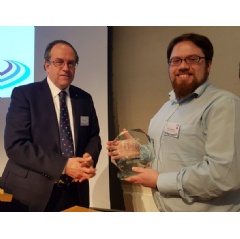Science for a Successful Nation shows impact of EPSRC-supported research
- First grant from the Rosalind Franklin Institute announced
- New interactive Lens on Research and Innovation (LoRI) graphic launched
- Winner of winners EPSRC Photography Competition elected
The Engineering and Physical Sciences Research Council’s ’Science for a Successful Nation 2018’ event showcased the revolutionary impact that engineering, maths and the physical sciences has on the UK and the world.
Held at the Royal Society in London, the event featured panel discussions themed around EPSRC’s four Prosperity Outcomes - Connected, Healthy, Productive, Resilient - and more than a dozen exhibitors demonstrating the impact of EPSRC-supported research in areas as diverse as healthcare, energy, cybersecurity and even musical instruments.
At the event, EPSRC’s Chief Executive Professor Philip Nelson also announced the first grant to be awarded through the new Rosalind Franklin Institute, an innovative multi-disciplinary science and technology research centre named in honour of the pioneering British scientist and delivered and managed by EPSRC following a £100 million government investment.
Science for a Successful Nation also marked the debut of Lens on Research and Innovation (LoRI), an interactive graphic which allows you to explore the breadth of EPSRC’s portfolio, through either a sector or lifestyle lens.
By scrolling over the graphic and selecting sectors or areas of interest to you, key facts and figures, case studies and short videos will appear that demonstrate the breadth and impact of the investments we have made in this area.
The event also saw the winner of winners from five years of EPSRC’s Science Photography Competition announced. The University of Cambridge’s James Macleod, whose image Graphene IPA Ink won the 2016 competition, was announced as the overall winner by Martin Keene, Picture Editor at the Press Association and five-time judge.
The annual competition has achieved widespread media coverage for research year on year. The 2017 winner, Single Atom in an Ion Trap by David Nadlinger from the University of Oxford, generated headlines around the world recently, with coverage of the 2017 competition featuring in publications ranging from The Daily Telegraph and The Guardian to The National Geographic and outlets in the USA, Russia and Pakistan.
The new Rosalind Franklin Institute will follow in the spirit of its namesake, who was one of the key figures in the discovery of the structure of DNA and used a technique with roots in physics and technology to transform life science.
It will develop unique new techniques and tools based on advances in engineering and physical science and apply them for the first time to biological problems.
£1.55 million has been awarded through the Institute to fund the development of a time-resolved high-resolution transmission electron microscope, the first stage of a £10 million project to build a ground-breaking microscope which will be the first of its kind in the world. The project is led by Professor Angus Kirkland, Oxford University, and leader of the Correlated Imaging theme at The Rosalind Franklin Institute.
The project will significantly advance the electron microscopy for life sciences within the UK, a technique which allows visualisation of structures at near atomic scale in time and space. The ability to quickly image structures before they damage will allow researchers to understand how drugs interact with their targets and enable understanding of many biological processes in exquisite detail.
Professor Nelson said of the announcement: The Rosalind Franklin Institute will help secure the country as one of the best places in the world to research, discover and innovate.
This first grant is an important milestone and a signal of intent for the new institute, offering the potential to significantly advance the UK’s life sciences capability by allowing researchers to understand how drugs interact with their targets.
( Press Release Image: https://photos.webwire.com/prmedia/7/220696/220696-1.jpg )
WebWireID220696
This news content was configured by WebWire editorial staff. Linking is permitted.
News Release Distribution and Press Release Distribution Services Provided by WebWire.
